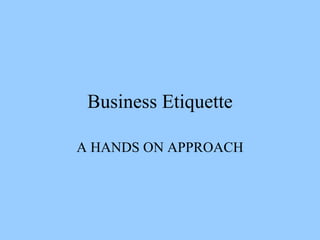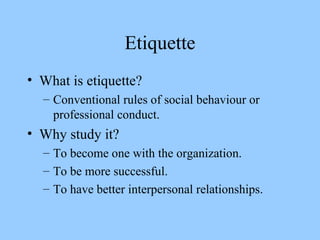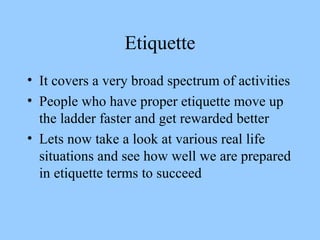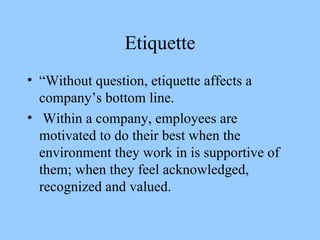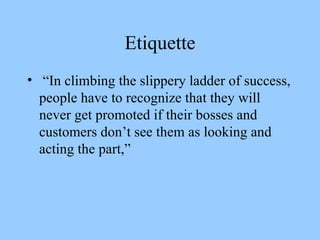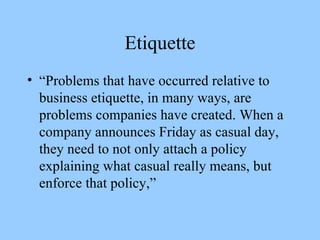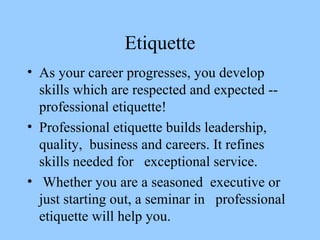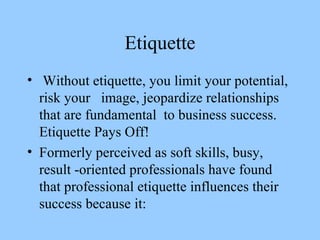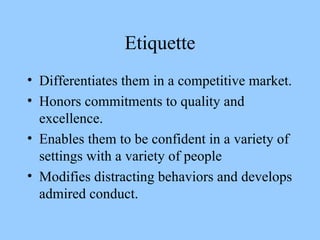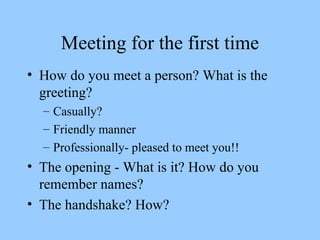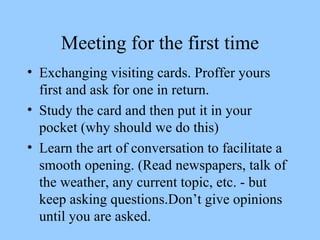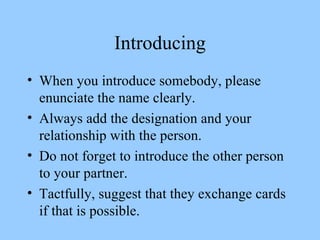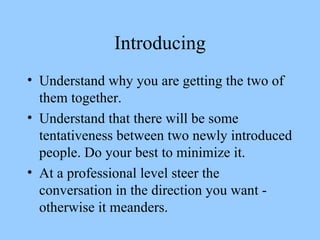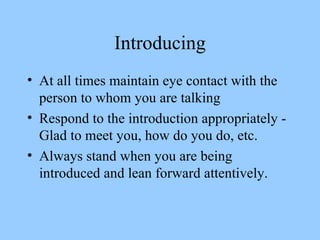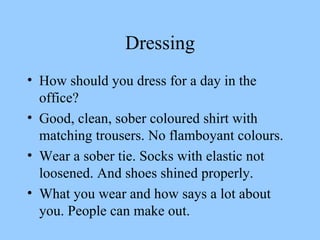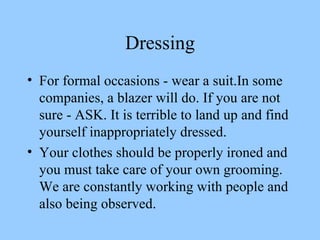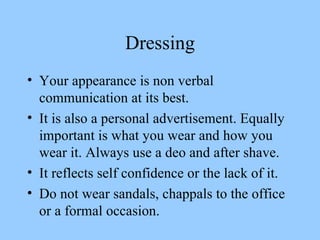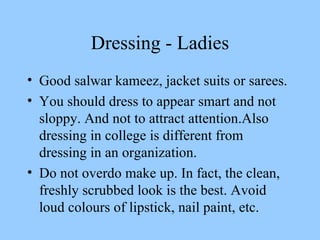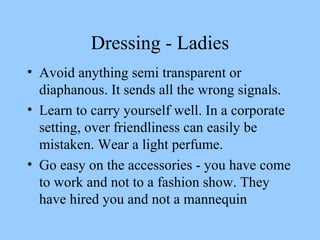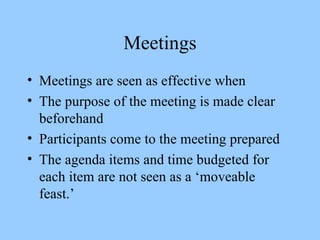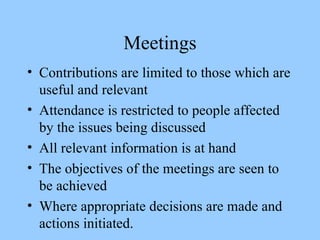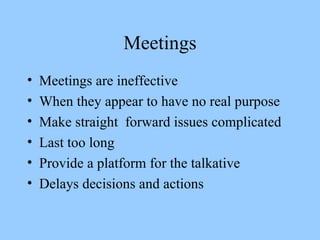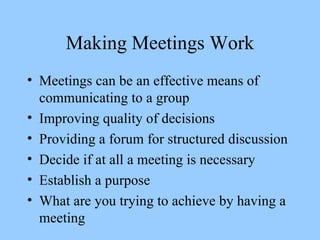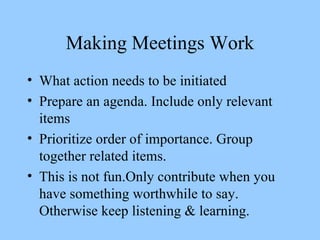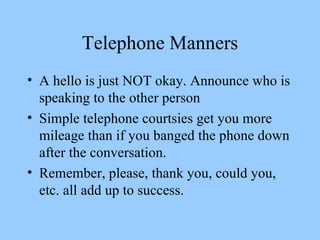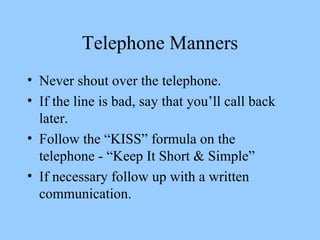Business Etiquette
- 1. Business Etiquette A HANDS ON APPROACH
- 2. Etiquette What is etiquette? Conventional rules of social behaviour or professional conduct. Why study it? To become one with the organization. To be more successful. To have better interpersonal relationships.
- 3. Etiquette It covers a very broad spectrum of activities People who have proper etiquette move up the ladder faster and get rewarded better Lets now take a look at various real life situations and see how well we are prepared in etiquette terms to succeed
- 4. Etiquette “Without question, etiquette affects a company’s bottom line. Within a company, employees are motivated to do their best when the environment they work in is supportive of them; when they feel acknowledged, recognized and valued.
- 5. Etiquette “In climbing the slippery ladder of success, people have to recognize that they will never get promoted if their bosses and customers don’t see them as looking and acting the part,”
- 6. Etiquette “Problems that have occurred relative to business etiquette, in many ways, are problems companies have created. When a company announces Friday as casual day, they need to not only attach a policy explaining what casual really means, but enforce that policy,”
- 7. Etiquette As your career progresses, you develop skills which are respected and expected -- professional etiquette! Professional etiquette builds leadership, quality, business and careers. It refines skills needed for exceptional service. Whether you are a seasoned executive or just starting out, a seminar in professional etiquette will help you.
- 8. Etiquette Without etiquette, you limit your potential, risk your image, jeopardize relationships that are fundamental to business success. Etiquette Pays Off! Formerly perceived as soft skills, busy, result -oriented professionals have found that professional etiquette influences their success because it:
- 9. Etiquette Differentiates them in a competitive market. Honors commitments to quality and excellence. Enables them to be confident in a variety of settings with a variety of people Modifies distracting behaviors and develops admired conduct.
- 10. Meeting for the first time How do you meet a person? What is the greeting? Casually? Friendly manner Professionally- pleased to meet you!! The opening - What is it? How do you remember names? The handshake? How?
- 11. Meeting for the first time Exchanging visiting cards. Proffer yours first and ask for one in return. Study the card and then put it in your pocket (why should we do this) Learn the art of conversation to facilitate a smooth opening. (Read newspapers, talk of the weather, any current topic, etc. - but keep asking questions.Don’t give opinions until you are asked.
- 12. Introducing When you introduce somebody, please enunciate the name clearly. Always add the designation and your relationship with the person. Do not forget to introduce the other person to your partner. Tactfully, suggest that they exchange cards if that is possible.
- 13. Introducing Understand why you are getting the two of them together. Understand that there will be some tentativeness between two newly introduced people. Do your best to minimize it. At a professional level steer the conversation in the direction you want - otherwise it meanders.
- 14. Introducing At all times maintain eye contact with the person to whom you are talking Respond to the introduction appropriately - Glad to meet you, how do you do, etc. Always stand when you are being introduced and lean forward attentively.
- 15. Dressing How should you dress for a day in the office? Good, clean, sober coloured shirt with matching trousers. No flamboyant colours. Wear a sober tie. Socks with elastic not loosened. And shoes shined properly. What you wear and how says a lot about you. People can make out.
- 16. Dressing For formal occasions - wear a suit.In some companies, a blazer will do. If you are not sure - ASK. It is terrible to land up and find yourself inappropriately dressed. Your clothes should be properly ironed and you must take care of your own grooming. We are constantly working with people and also being observed.
- 17. Dressing Your appearance is non verbal communication at its best. It is also a personal advertisement. Equally important is what you wear and how you wear it. Always use a deo and after shave. It reflects self confidence or the lack of it. Do not wear sandals, chappals to the office or a formal occasion.
- 18. Dressing - Ladies Good salwar kameez, jacket suits or sarees. You should dress to appear smart and not sloppy. And not to attract attention.Also dressing in college is different from dressing in an organization. Do not overdo make up. In fact, the clean, freshly scrubbed look is the best. Avoid loud colours of lipstick, nail paint, etc.
- 19. Dressing - Ladies Avoid anything semi transparent or diaphanous. It sends all the wrong signals. Learn to carry yourself well. In a corporate setting, over friendliness can easily be mistaken. Wear a light perfume. Go easy on the accessories - you have come to work and not to a fashion show. They have hired you and not a mannequin
- 20. Meetings Meetings are seen as effective when The purpose of the meeting is made clear beforehand Participants come to the meeting prepared The agenda items and time budgeted for each item are not seen as a ‘moveable feast.’
- 21. Meetings Contributions are limited to those which are useful and relevant Attendance is restricted to people affected by the issues being discussed All relevant information is at hand The objectives of the meetings are seen to be achieved Where appropriate decisions are made and actions initiated.
- 22. Meetings Meetings are ineffective When they appear to have no real purpose Make straight forward issues complicated Last too long Provide a platform for the talkative Delays decisions and actions
- 23. Making Meetings Work Meetings can be an effective means of communicating to a group Improving quality of decisions Providing a forum for structured discussion Decide if at all a meeting is necessary Establish a purpose What are you trying to achieve by having a meeting
- 24. Making Meetings Work What action needs to be initiated Prepare an agenda. Include only relevant items Prioritize order of importance. Group together related items. This is not fun.Only contribute when you have something worthwhile to say. Otherwise keep listening & learning.
- 25. Telephone Manners A hello is just NOT okay. Announce who is speaking to the other person Simple telephone courtsies get you more mileage than if you banged the phone down after the conversation. Remember, please, thank you, could you, etc. all add up to success.
- 26. Telephone Manners Never shout over the telephone. If the line is bad, say that you’ll call back later. Follow the “KISS” formula on the telephone - “Keep It Short & Simple” If necessary follow up with a written communication.

